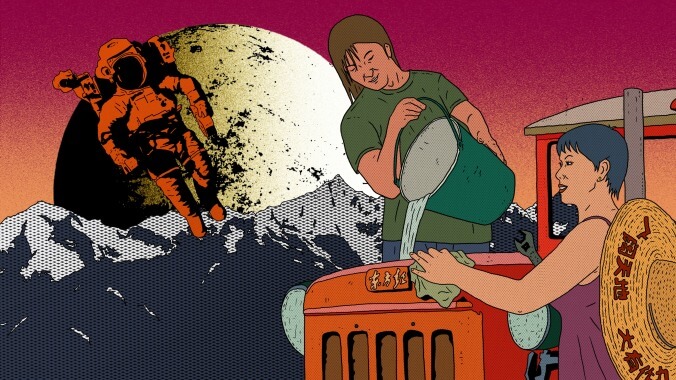To comics fans, the drawing style of the Chinese independent animator Liu Jian should look familiar. His meticulous linework, muted solid colors, and interplay of simple features and crisp details brings to mind Adrian Tomine and an assortment of other like-minded graphic novelists and alternative cartoonists. There’s novelty in seeing it off the page, if not exactly in motion. His animation is often limited to a single fizzling neon sign, smoking cigarette, or jerky movement in a panel-like frame; the static style is part and parcel to Liu’s deadpan black humor, which is by turns dryly ironic and surreal.
The setting of Have A Nice Day, Liu’s second feature (and first to get American distribution), is a depressed, unnamed town somewhere in southern China, where the theft of a bag stuffed with 1 million yuan (about $150,000) sends a disparate cast of characters scrambling to get their hands on the loot. The thief is Xiao Zhang (Zhu Changlong), who wants the money so that his girlfriend can get corrective plastic surgery in South Korea. (Her last cosmetic procedure didn’t turn out as expected.) But the cash belongs to the philosophizing mobster Uncle Liu (Yang Shiming), who dispatches Skinny (Ma Xiaofeng), a greenish butcher-slash-hitman in a black coat and fedora, to recover the money. Uncle Liu, who dresses like he stepped out of Miami Vice, doesn’t have time to do the job himself; he’s busy torturing one of his childhood friends, a local painter.
By the time Skinny manages to track the young man to a railroad hotel, the bag has already changed hands, stolen away by Yellow Eyes (Cao Kou), a self-taught inventor armed with X-ray glasses and an Inspector Gadget-ian hammer, who plans to use the money to fund a start-up. Liu is clearly inspired by live-action filmmakers (the Coen brothers and the Japanese actor-director Takeshi Kitano are acknowledged influences), but his casual side trips into the fantastic—say, an extended daydream sequence that’s part parody of Cultural Revolution propaganda, part karaoke video—can only work in drawing. His characters’ motivations are small-time and small-minded, but the world they inhabit is bizarre and bedecked with items of high and low foreign culture that seem to mock their surroundings, be it the Counter-Strike sound effects blasting through an internet café, the Rocky poster in Skinny’s butcher shop, or the Leo Tolstoy quote (“Still spring was spring, even in the town”) that begins the film before cutting to the opening shot of an unsightly construction project.
But then, as Jia Zhangke and other filmmakers have shown, perhaps the best way to portray life under rapid development and globalization is through the lens of the absurd. Crime always reveals something about its perpetrators, and in this collection of scheming characters and dumpy locales, one finds a wide sample of social caricatures. Superstitions are a running topic of conversation; from turtle meat or Western educations, local shrines or Steve Jobs quotes, it’s all the same hoodoo as far as Liu is concerned. Despite the opening Tolstoy quote’s reference to spring, the story seems to be set on November 9, 2016, which adds to the air of irony; Donald Trump’s victory speech from that day is heard coming from a car radio. (China launched five satellites the same day, which explains the rocket that crosses the evening sky in one scene.) Maybe it’s reality that’s parodic.

 Keep scrolling for more great stories.
Keep scrolling for more great stories.
